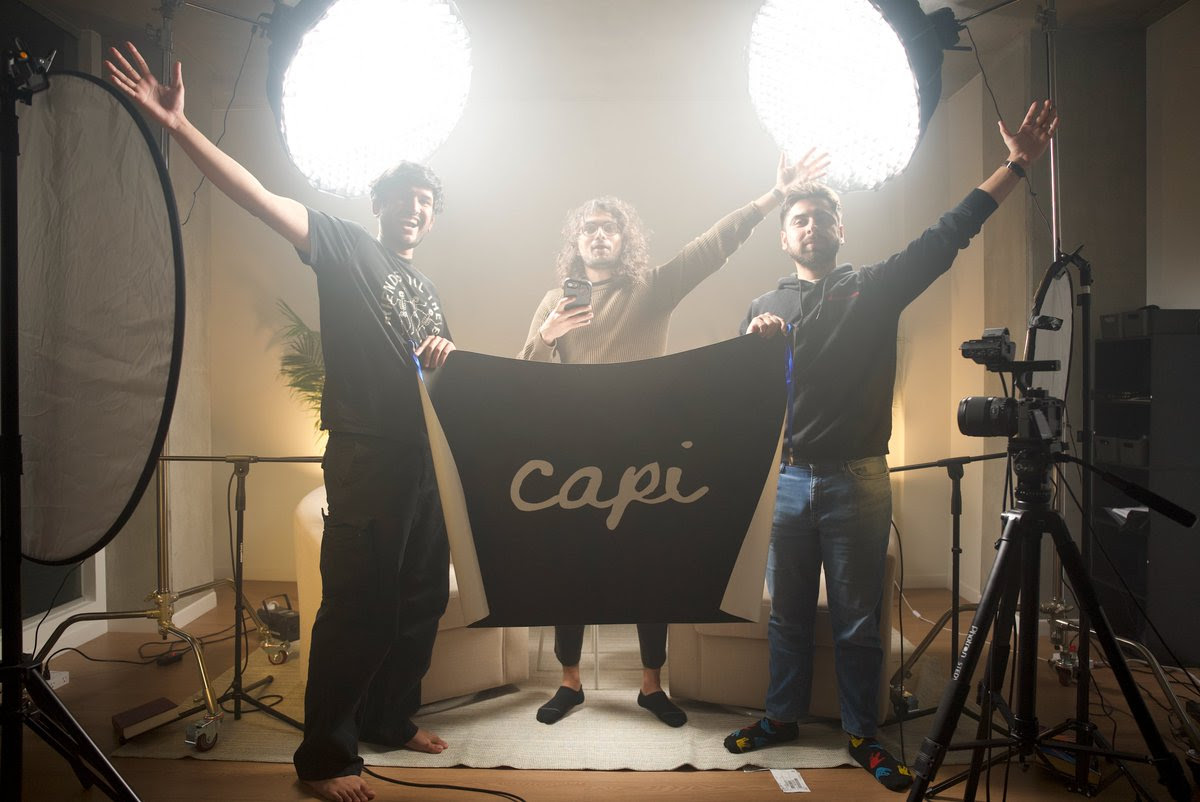Ebaad Rehman's Mission to Amplify the Voices of Immigrant Founders Through Storytelling and Community

Stories have the power to change our lives, especially when one’s path forward is unclear. For immigrant founders in the US navigating visa requirements, business challenges, and cultural barriers, the stories of accomplished founders can serve as both an inspiration and a blueprint.
That’s why Ebaad Rehman, a storyteller, developer, and community builder who immigrated to the US from Pakistan, is launching Against All Odds by Capi Studio, a podcast that showcases the stories of immigrant founders and provides resources for immigrants pursuing their own founder journeys.
Introducing Against All Odds: Amplifying the Voices of Immigrant Founders
Although “56% of billion dollar companies have at least one immigrant founder,” Ebaad explains, “usually as an immigrant founder it’s not a very easy journey. There are very few of us, and there is no set path.”
Traditional media highlights the big wins—the funding rounds, the acquisitions—but few showcase what Ebaad calls “the mud beneath the metals.” The reality is that most immigrant founders have multiple failed companies before they achieve success, and many must navigate a complex array of psychological challenges while trying to build an impactful business.
With Against All Odds, Ebaad aims to provide immigrant founders with both the inspirational vision and the practical toolkit for navigating the founder journey. In addition to sharing success stories, episodes will dive into the struggles beneath the surface that are often overlooked, like co-founder breakups, rejections, and burnout, and provide practical guidance to help aspiring founders get started, such as how to secure O1 visas and work authorization.
The team recently launched their first episode, featuring Yoeven Khemlani, founder of Jigsaw Stack, with many more to be released in the coming months.
Fostering Community Through Storytelling
The art and power of storytelling has been an anchor throughout Ebaad’s life. Growing up in Pakistan, Ebaad had his first works of poetry published in the local newspaper at age 11. By the time he was in high school, he was running a production company partnering with the country’s biggest brands and celebrities.
Ebaad left Pakistan to study computer science at college in the United States. But after graduating, he felt he’d lost touch with his love for storytelling and chose to focus on teaching instead of getting a job in tech.
He taught kids to code and launched a blog on data structures and algorithms, which amassed over 10,000 readers. “I taught everything under the sun, from coding Minecraft games to building full stack applications,” Ebaad explained. “Teaching I think is very rooted in storytelling.”
As Ebaad’s journey as an educator progressed, he became immersed in San Francisco’s immigrant founder community, joining AI training campus Build Club as Head of E-Learning and organizing everything from book clubs to accountability groups for his peers. He soon noticed that many of his fellow immigrant founders were facing a similar set of emotional and logistical challenges but didn’t have a place to discuss them. So he set out to give the burgeoning community a home and founded Capi House, an immigrant hacker house providing guidance and support for immigrant founders.
The house became an invaluable resource for immigrant founders across the city, helping them navigate everything from visa challenges to branding. But Ebaad knew that there were thousands of immigrant founders across the US that didn’t have access to the resources available in the Bay Area. With the launch of Capi Studio, Ebaad is scaling the community and bringing both inspirational stories and practical advice to immigrant founders across the country.
Ebaad’s Advice for Fellow Founders
The founder journey can seem confusing and unclear, especially for immigrant founders navigating the path thousands of miles from home. Ebaad notes that while everyone’s circumstances are different, it’s important for founders to take ownership over their own path. “Agency helps everyone. You might not be very satisfied with where you are, but if you take agency into your own hands and chart your own course, you can escape that.”
To learn more about Capi Studio, you can follow Ebaad on X and check out episode one.
Up to 3,500 bonus and 3% cash-back on all card spend [3], 6 months off payroll, and 50% off bookkeeping for 6 months, free R&D credit.
Frequently Asked Questions
- How do I sign up for Every?
You can get started right away—just click “Get Started” and follow a short onboarding flow. Prefer a little help? One of our specialists can walk you through incorporation, banking, payroll, accounting, or whatever you need.
- What features does Every offer?
Every gives startups a complete back office in one platform. From incorporation and banking to payroll, bookkeeping, and tax filings, we take care of the operational heavy lifting—so you can spend more time building, less time managing.
- How is Every different from other tools?
Most competitors give you software. Every gives you a full-stack finance and HR team—plus smart financial tools that actually benefit founders. Earn up to 4.3% interest on idle cash and get cash back on every purchase made with your Every debit cards, routed straight back to you.
Every is not a bank. Banking services provided by Thread Bank, Member FDIC. Your deposits qualify for up to $3,000,000 in FDIC insurance coverage when Thread Bank places them at program banks in its deposit sweep program. Pass-through insurance coverage is subject to conditions. The Every Visa Business Debit Card is issued by Thread Bank, Member FDIC, pursuant to a license from Visa U.S.A. Inc. and may be used anywhere Visa cards are accepted.
- Is my data secure with Every?
We use end-to-end encryption, SOC 2-compliant infrastructure, and rigorous access controls to ensure your data is safe. Security isn’t a feature—it’s foundational.
Can I switch to Every if my company is already set up?Yes—you can switch to Every at any time, even if your company is already incorporated and running. Whether you're using separate tools for banking, payroll, bookkeeping, or taxes, we’ll help you bring everything into one place. Our onboarding specialists will guide you through the process, make sure your data is transferred cleanly, and get you set up quickly—without disrupting your operations. Most founders are fully transitioned within a week.
- What stage of startup is Every best for?
Every is designed for startups from day zero through Series A and beyond. Whether you're just incorporating or already running payroll and managing expenses, we meet you where you are. Early-stage founders use Every to get up and running fast—with banking, payroll, bookkeeping, and taxes all handled from day one. Growing teams love how Every scales with them, replacing patchwork tools and manual work with a clean, unified system.
We’re especially valuable for teams who want to move fast without hiring a full finance or HR team—giving founders more time to build, and fewer distractions from admin and compliance
- How long does onboarding take?
Onboarding with Every is fast and efficient. For most startups, the process typically takes between 3 to 7 days, depending on your specific needs and how much setup you already have in place.
If you're a new company, you'll be up and running quickly—getting your banking, payroll, and bookkeeping set up without hassle. If you’re transitioning from another system, our specialists will help you migrate your data, ensuring a smooth switch with no gaps or errors in your operations.
We guide you every step of the way, from incorporation to setting up automated payroll to handling your taxes—so you can focus on growing your business. Our goal is to make sure you're fully operational and confident in your back office in under a week.
Practical Questions to Ask to Ensure Your Bank is Well Managed
How much liquidity does the bank have on hand to cover unexpected withdrawals or shortfalls?
What percentage of the bank's deposits are invested in longer-term securities and loans, and what percentage is kept as cash reserves?
How does the bank diversify its investment portfolio to minimize potential losses and reduce risks?












